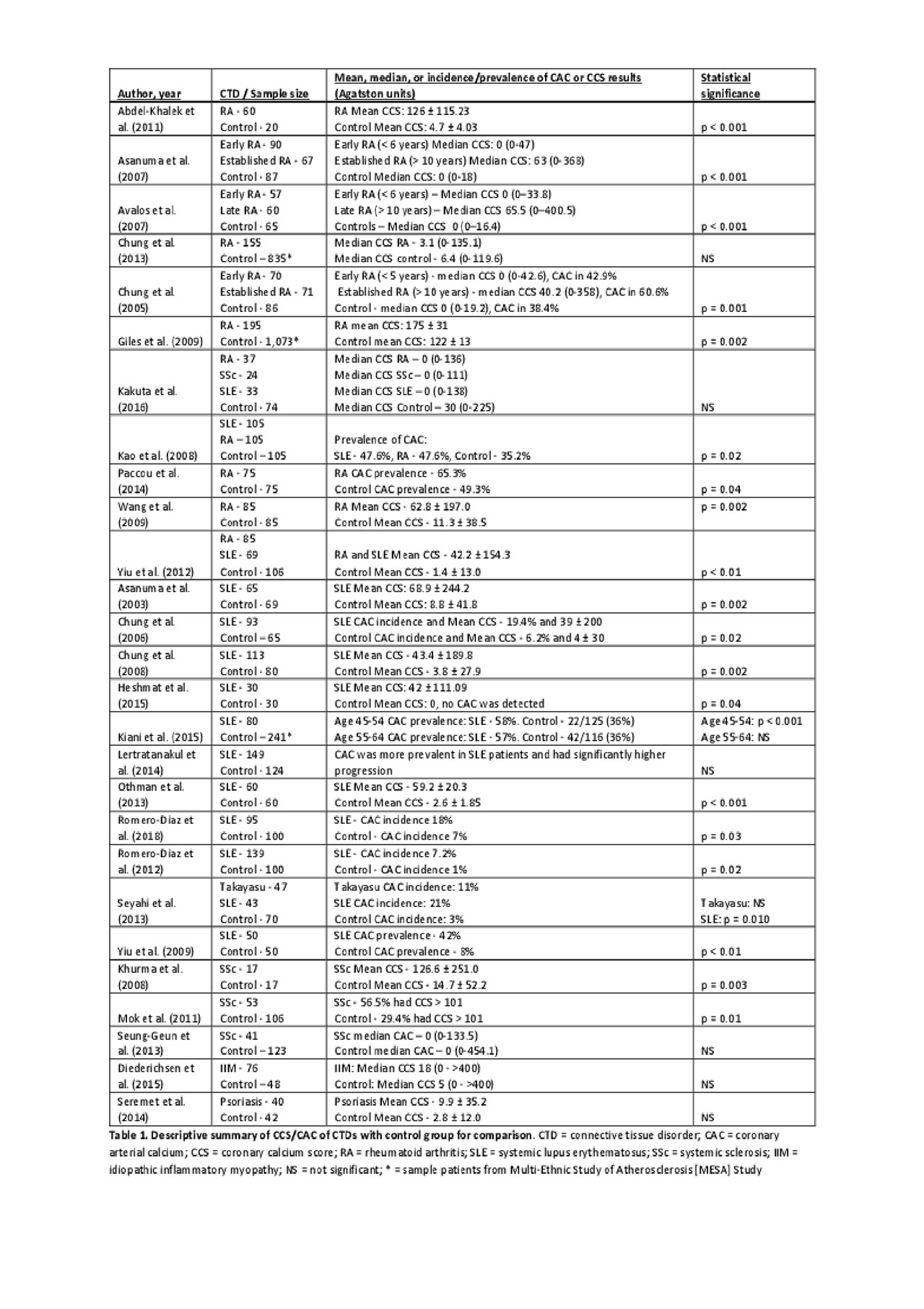Session Information
Session Type: Poster Session (Monday)
Session Time: 9:00AM-11:00AM
Background/Purpose: Recent literature shows that connective tissue disorders (CTDs) are positively associated with subclinical atherosclerosis via chronic activation of inflammatory pathways, or direct endothelial injury. Multidetector computed tomography (MDCT) is non-invasive and has emerged as a modality of estimating coronary calcium score (CCS) and prevalence of coronary arterial calcium (CAC) as a potential marker of risk for cardiac events, such as myocardial infarction. The objective of our study is to assess the utility of CCS, based on the current published data in CTDs as it relates to the presence of coronary atherosclerosis in CTDs.
Methods: Following the PRIMSA guidelines, a literature search was done in PubMed, Embase, Scopus, Web of Science Core Collection, CINAHL, and Cochrane Database of Systematic Review. Inclusion criteria consisted of studies that investigated CCS in adults across the spectrum of CTDs, such as: rheumatoid arthritis (RA), seronegative spondyloarthropathies, systemic lupus erythematous (SLE), systemic sclerosis (SSc), idiopathic inflammatory myopathies (IIM) and vasculitides. Studies were excluded if a complete manuscript was not written in English, or if it was a single case report. The quality of articles included were assessed using the Newcastle-Ottawa Scale (NOS) assessment scale for cohort studies and the Agency for Healthcare Research and Quality (AHRQ) criteria for cross-sectional studies.
Results: The initial search revealed 1907 citations, but after we eliminated duplicates, studies that did not reference CCS/CAC, and abstracts only, we reviewed 121 full text publications (Figure 1). 31 studies were included in this review (27 with healthy age/gender matched control group and 4 without). The CTDs analyzed in articles with a control group for comparison (Table 1) were: 11 RA, 14 SLE, 4 SSc, 1 IIM, 1 Takayasu arteritis, and 1 psoriasis. 9 out of 11 RA studies, 12 out of 14 SLE studies, and 2 out of 4 SSc studies showed statistically significant increased CCS or CAC prevalence/incidence when compared to control group. The CTDs analyzed without a control group for comparison (Table 2) were: 2 Kawasaki disease, 1 juvenile idiopathic arthritis (JIA), and 1 antiphospholipid syndrome (APS). These studies demonstrated increased CAC burden, however without statistically significant data.
Conclusion: This systematic review demonstrates that some CTDs (RA and SLE) have higher CCS and/or CAC incidence/prevalence compared to normal controls, while the SSc data is still ambiguous. This study also identified that aside from Takayasu arteritis and Kawasaki disease, there is currently no published data in the spectrum of vasculitides, which are associated with high inflammatory burden. Based on the current published data, it is unclear if MDCT-measured CCS is a reliable and generalizable tool to assess subclinical atherosclerosis across the spectrum of CTDs, however we ascertain that it can be useful for cardiovascular risk assessment in patients with SLE and RA.
To cite this abstract in AMA style:
Farshad S, Halalau A, Townsend W, Schiopu E. Utility of Coronary Calcium Scoring (CCS) in the Spectrum of Connective Tissue Disorders (CTDs) for the Evaluation of Subclinical Coronary Atherosclerosis – a Systematic Review [abstract]. Arthritis Rheumatol. 2019; 71 (suppl 10). https://acrabstracts.org/abstract/utility-of-coronary-calcium-scoring-ccs-in-the-spectrum-of-connective-tissue-disorders-ctds-for-the-evaluation-of-subclinical-coronary-atherosclerosis-a-systematic-review/. Accessed .« Back to 2019 ACR/ARP Annual Meeting
ACR Meeting Abstracts - https://acrabstracts.org/abstract/utility-of-coronary-calcium-scoring-ccs-in-the-spectrum-of-connective-tissue-disorders-ctds-for-the-evaluation-of-subclinical-coronary-atherosclerosis-a-systematic-review/



